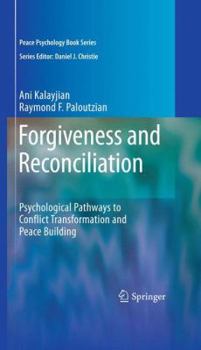Forgiveness and Reconciliation: Psychological Pathways to Conflict Transformation and Peace Building
(Part of the Peace Psychology Book Series Series)
Select Format
Select Condition 
Book Overview
We all long for peace within ourselves, families, communities, countries, and throughout the world. We wonder what we can do about the multitude of con'icts currently wreaking havoc across the globe and the continuous reports of violence in communities as well as within families. Most of the time, we contemplate solutions beyond our reach, and overlook a powerful tool that is at our disposal: forgiveness. As a genocide survivor, I know something about it. As the genocide unfolded in Rwanda in 1994, I was devastated by what I believed to be the inevitable deaths of my loved ones. The news that my parents and my seven siblings had indeed been killed was simply unbearable. Anger and bitterness became my daily companions. Likewise, I continued to wonder how the Hutus and Tutsis in Rwanda could possibly reconcile after one of the most horrendous genocides of the 20th century. It was not until I came to understand the notion of forgiveness that I was able to see the light at the end of the tunnel. Common wisdom suggests that forgiveness comes after a perpetrator makes a genuine apology. This wisdom informs us that in the aftermath of a wrongdoing, the offender must acknowledge the wrong he or she has done, express remorse, express an apology, commit to never repeating said harm, and make reparations to theextentpossible.Onlythencanthevictimforgiveandagreetoneverseekrevenge.
Format:Paperback
Language:English
ISBN:1441962190
ISBN13:9781441962195
Release Date:June 2010
Publisher:Springer
Length:306 Pages
Weight:1.05 lbs.
Dimensions:0.7" x 6.1" x 9.0"
Customer Reviews
0 rating





